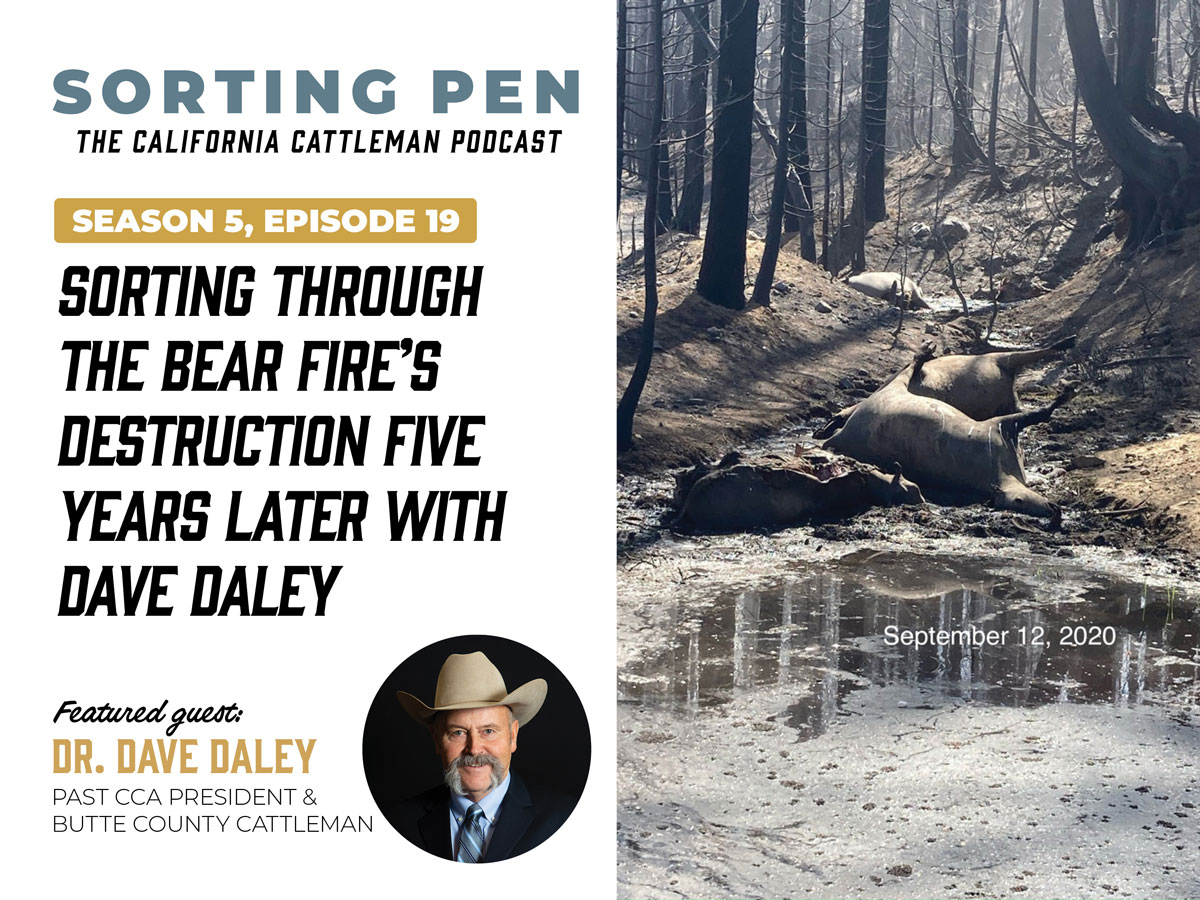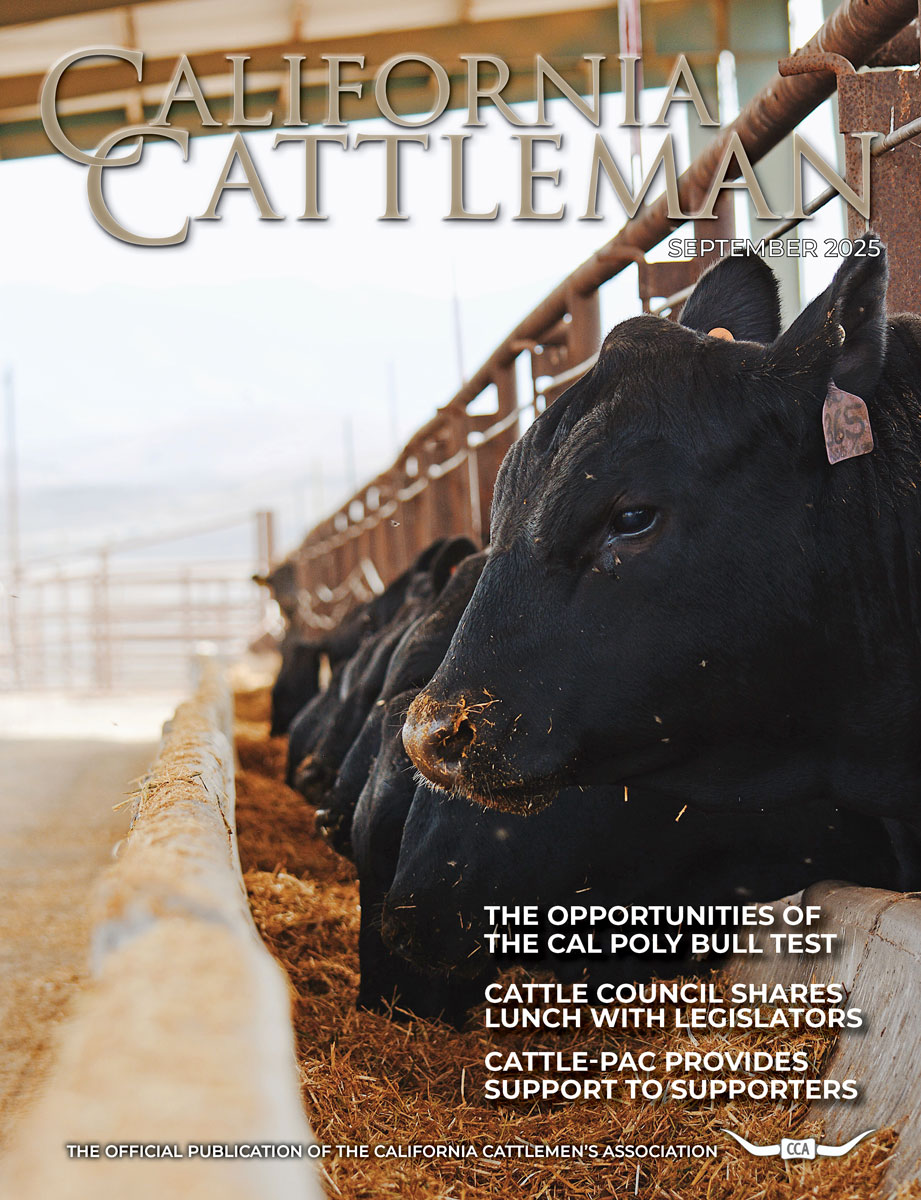
CALIFORNIA CATTLEMAN WEEKLY
Sept. 15, 2025
To read the full version each week, please subscribe below.
California Legislature Adjourns for the Year
The California Legislature gaveled to a close on Saturday, one day later than the September 12 adjournment contemplated in the body’s joint rules; the extended deliberations were necessitated by the State Constitution’s ‘72-hour rule’ after legislative leaders waited until 10:21am Wednesday to put into print AB 1207, a measure reauthorizing the state’s ‘Cap-and-Invest Program’ through 2045.
As reported in last week’s California Cattleman Weekly, CCA had three priority bills still pending in the statehouse as the final week of session began. CCA-sponsored AB 411 (Papan), which would legalize on-ranch composting for routine livestock mortalities, is currently awaiting action by Governor Gavin Newsom after passing the Senate 39-0 last week. The Assembly, which had already approved the measure earlier this year, concurred in Senate amendments on Tuesday by a vote of 77-0, meaning the bill never took a ‘no’ vote this year despite stiff opposition, including from California labor groups.
CCA also scored a late legislative victory when CCA-opposed AB 1156 (Wicks), which would have facilitated conversion of Williamson Act contracts to solar use easements, was moved to the Senate’s “inactive file” on Saturday morning.
The end of the legislative session was not without setbacks, however. CCA-opposed AB 1264 (Gabriel), which would prohibit schools from serving “ultraprocessed foods of concern” and “restricted school foods,” advanced out of the Legislature on Friday. CCA has opposed the measure because the ambiguous language it uses to define “ultraprocessed foods” could capture nutritious products such as beef. Should the Governor approve AB 1264, CCA will work to ensure that the California Department of Public Health’s implementation of the bill does not restrict healthy beef products from being provided to school students.
Speaking of ultraprocessed foods, the Legislature on Friday approved a “budget bill junior” allocating $10 billion in funds from the 2024 Climate Bond which, among other provisions, appropriates $1 million to the U.C. Davis Integrative Center for Alternative Meat and Protein – a line item which was strenuously opposed by CCA and a coalition of agricultural and environmental groups in the final days of the session. Other climate outlays are more favorable for the state’s cattle producers, with significant investments in groundwater recharge, flood control and wildfire resilience.
Governor Newsom now has until October 13 to sign or veto any bills advanced to his desk. A full run-down of how CCA’s 2025 legislative priorities fared this year will be included in the November or December editions of the California Cattleman magazine.
CCA Delegation in DC to Lobby Federal Lawmakers
A delegation of CCA leadership is in Washington, D.C. this week lobbying Congress and federal regulators to advance California cattle producers’ policy priorities.
CCA officers, staff and members met today with a wide array of federal agencies to advocate for a more favorable regulatory environment. The delegation began the morning in the nation’s capital at USDA headquarters, meeting with USDA Deputy Under Secretary for Farm Production and Conservation Brooke Appleton, followed by a meeting with Farm Service Agency Administrator Bill Beam. Late in the morning, CCA President Rick Roberti and Wolf Policy Subcommittee Chair Paul Roen met with US Fish & Wildlife Service Director Brian Nesvik to press federal authorities to appropriately manage gray wolves that are decimating livestock herds in the Sierra Valley, Siskiyou County and elsewhere in Northern California.
In the afternoon, CCA’s delegation met with leadership of USDA’s Marketing a Regulatory Programs – including Animal and Plant Health Inspection Service Administrator Dr. Michael Watson – to discuss New World screwworm control and prevention measures and to advance the Association’s international trade priorities relative to cattle imports. CCA ended the day in meetings with Bureau of Land Management and US Forest Service leadership to discuss wildfire resilience, various issues related to grazing permit administration and BLM’s proposal to rescind its “Conservation and Landscape Health Rule” (more on that below).
CCA’s advocates will head to Capitol Hill tomorrow to meet with members of California’s Congressional delegation, pressing for Congressional oversight to help advance the regulatory priorities advocated today and to lobby in favor of the Association’s legislative priorities.
Full details of CCA’s Washington, D.C. “Fly-in” will be available in the October edition of California Cattleman magazine.
BLM Proposes Recission of Biden-Era Public Lands Rule
The Bureau of Land Management on Thursday published a proposed rule to rescind its “Conservation and Landscape Health Rule,” also known as the Public Lands Rule. Of particular concern to CCA, the Biden-era regulation established conservation as a “use” of BLM-managed lands under the agency’s multiple-use mandate, allowing entities to lease BLM ground for “restoration or land enhancement” or for mitigation. The rule also ramped up identification and designation of Areas of Critical Environmental Concern in response to a Biden Administration directive that federal agencies incorporate wildlife habitat connectivity into their planning activities.
CCA had joined with our national partner the Public Lands Council and 57 other organizations in opposing the 2024 regulation, concerned that the Proposed Rule could result in restrictions limiting grazing use of certain BLM lands.
In its proposal to rescind the rule, the BLM has acknowledged that elements of the regulation – which is the subject of ongoing litigation by the Public Lands Council and other groups – “unlawfully and unnecessarily expanded the scope of the BLM’s regulations.”
The proposal to rescind the regulation is now subject to a 60-day comment period, which will close on November 10. CCA will again partner with our industry allies to protect multiple use of BLM lands – this time by supporting the proposed regulatory change.
Registration Now Open for the 2025 CCA & CCW Annual Convention
Attendee registration is officially open for the 2025 California Cattlemen’s Association and California CattleWomen’s Convention & California Cattle Industry Tradeshow, happening Dec. 3–5 at the Atlantis Casino Resort Spa in Reno, Nev.
Join us for meetings, networking, and entertainment. Full registrations include access to general sessions, the tradeshow, and meals at the Welcome Party, Thursday breakfast, and Thursday lunch. Tickets for special events such as the CCW Awards Breakfast, Cowbelle of the Year Lunch, and CCA/CCW Awards Banquet are available separately.
Rates start at $100 for Young Cattlemen’s Committee members and $300 for CCA/CCW members. Secure your spot soon as prices will increase after Nov. 13. To register, click here.
Apply for a CCA Scholarship
In 2024, CCA awarded over $51,000 in scholarships to students studying agriculture. The application period for CCA’s 2025 scholarships is open now through October 1. Any young, regular, or feeder member are eligible to apply for the scholarship. Scholarship amounts and quantities vary year to year and recipients of the CCA scholarship program can re-apply the following year. To learn more and to download the application, click here. Applications must be typed and returned in full to the CCA office by Wednesday, October 1, at 11:59pm PST via email to Katie Roberti at katier@calcattlemen.org.
Apply now to intern Dec. 3-5 at CCA’s Annual Convention
The application period for the 2025 California Cattlemen’s Association Convention Internships are being accepted now through Oct. 10. Interns assist with registration, directing attendees, running the CCA merchandise table and much more. Additionally, interns have the opportunity to connect with industry leaders, and attend select meetings, general sessions, and the tradeshow with a complimentary registration. To apply send a resume and cover letter detailing why you would like to serve as a convention intern to Katie Roberti at katier@calcattlemen.org by Friday, Oct. 10, at 11:59 p.m. PST. Any young, regular or feeder member are eligible to apply for this internship. Past interns are eligible to reapply. If you are not currently a CCA member and would like to join visit calcattlemen.org/join.
Upcoming CCA Events
Dec. 3 – 5, Atlantis Casino Resort Spa, Reno, Nevada
Upcoming Industry Events
Emergency Livestock Relief Program 2023 and 2024 Flood and Wildfire Webinar
Sept. 18, 10am PST, Virtual
The USDA Farm Service Agency is hosting a webinar to highlight the new Emergency Livestock Relief Program 2023 and 2024 Flood and Wildfire, which “provides emergency assistance to livestock producers to offset increased supplemental feed costs due to a qualifying flood or qualifying wildfire in calendar years 2023 and 2024.” To register, click here.
Cattle Industry Convention and NCBA Tradeshow
Feb. 3 – 5, 2026, Nashville
The largest event in the beef cattle industry is heading to downtown Nashville. Registration and housing opened Aug. 20. There are several exciting opportunities to get involved in the event with upcoming deadlines including the national anthem contest, convention internships for college juniors and seniors, scholarships for attendees (young producers, students, and first timers), and grants to offset the cost of attending. Learn more and apply at convention.ncba.org.
CCA in the News
Sierra Valley ranchers say wolves killing alarming number of livestock FOX 11 “Rick Roberti of the California Cattlemen’s Association noted that all major ranchers have suffered. ‘The wolf’s been put in a very terrible position to try and survive in an area when there’s nothing to eat, so they have to eat livestock,’ Roberti said. He added, ‘Our state knew that when they allowed them to come to our state. So we do hold them accountable for it.'” To continue reading, click here.
Daily Wolf Attacks Are Pushing A Northern California Community to the Breaking Point California Insider “Northern California ranchers are facing nightly wolf attacks and cattle losses that UC Davis researchers estimate can reach $162,000 for each wolf every year. In this episode, Rick Roberti, President of the California Cattlemen’s Association, Paul Roen, Chair of the Sierra County Board of Supervisors, and Michael Fisher, Sierra County Sheriff-Coroner discuss how the crisis is forcing hard choices for ranchers and creating safety concerns for nearby towns.” To watch the episode, click here.
Industry News
New study shows proactive forest management reduces high severity wildfire by 88% and stabilizes carbon during extreme droughts EurekAlert! “New research finds that treated forests are 88% less susceptible to high severity wildfire than their unmanaged counterparts, and can recover carbon stocks in only 7 years. The findings, carried out by researchers at Vibrant Planet, Northern Arizona University, American Forest Foundation, and Blue Forest, make the case for more proactive forest management across the US, and specifically, the increasingly wildfire-prone West.” To continue reading, click here.
Value of California Ag production tops $60 billion for first time CDFA Planting Seeds Blog “The USDA’s Economic Research Service (ERS) has released production data summaries for 2024 in California, with a total value for the year of $61.2 billion, an increase of 3.6 percent from 2023. This is the first time that the state’s production value has exceeded $60 billion.” To continue reading, click here.
Forest Service chief explains the need for active land management Deseret News “For Tom Schultz, the 21st chief of the U.S. Forest Service, repealing the Roadless Rule is not a matter of ideology but rather a matter of ‘common sense land management.’ Leaving land alone and letting nature run its course is not management, Schultz explained, but a ‘false narrative.’” To continue reading, click here.
Beef prices are spiking, but protein-obsessed shoppers keep coming back Yahoo Finance “Beef prices soared 13.9% in August from a year earlier. Despite that, demand is ‘remarkably resilient.’” To continue reading, click here.
It has been fire years to the week since that fire ripped through the Plumas National Forest and destroyed communities, legacies, the Daley family’s cow herd, and tragically ended lives. Dave Daley, Butte County Rancher and past CCA president, talks with Katie about where we are at on wildfire solutions in California. We also talk about the recovery progress (and lack of) on the land from that burn five years later. Click here to listen or stream it wherever you listen to podcasts.



